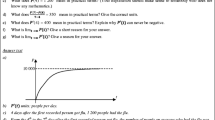Abstract
This study is part of a wider research program, which seeks to investigate the existence (or not) of relationships between sociomathematical and mathematical norms at different academic levels. Here, we consider the norms that arise in the interaction between primary student teachers when they solve a mathematical task related to the mathematical definition. We hypothesize that in the colloquial mathematical discourse between these students coexist two types of discourse as follows: sociomathematical and mathematical, each one with its specific norms. This coexistence can originate commognitive conflicts. We have been able to identify different commognitive conflicts that arose from the simultaneous existence of sociomathematical norms and mathematical norms linked to defining, approaching their generation.
Similar content being viewed by others
References
Biddle, B. J., & Thomas, E. J. (1966). Prescriptions. In B. J. Biddle & E. J. Thomas (Eds.), Role theory: Concepts and research (pp. 103–104). NY: Wiley and Sons, Inc.
Borasi, R. (1991). Learning mathematics through inquiry. Portsmouth: Heinemann Educational Books, Ins.
García, M., Sánchez, V., & Escudero, I. (2007). Learning through reflection in mathematics teacher education. Educational Studies in Mathematics, 64(1), 1–17.
Gorgorió, N., & Planas, N. (2005). Social representations as mediators of mathematical learning in multiethnic classrooms. European Journal of Psychology of Education, XX, 91–104.
Harel, G., Selden, A., & Selden, J. (2006). Advanced mathematical thinking. In A. Gutierrez & P. Boero (Eds.), Handbook of research on the psychology of mathematics education (pp. 147–172). Rotterdam: Sense Publishers.
Herbel-Eisenmann, B. (2003). Examining “norms” in mathematics education literature: Refining the lens. Paper presented at NCTM Research Pre-Session Symposium: The role of beliefs, values and norms in mathematics classroom: A conceptualization of theoretical lenses. San Antonio, TX, USA.
Hershkowitz, R., & Schwarz, B. (1999). The emergent perspective in rich learning environments: Some roles of tools and activities in the construction of sociomathematical norms. Educational Studies in Mathematics, 39, 149–166.
Kieran, C., Forman, E., & Sfard, A. (2001). Bridging the individual and the social: discursive approaches to research in mathematics education. A PME special issue. Educational Studies in Mathematics, 46, 1–3.
Lave, J., & Wenger, E. (1991). Situated learning. Legitimate peripheral participation. New York: Cambridge University Press.
Morgan, C. (2005). What is a definition for in school mathematics? In M. Bosch (Ed.), European Research in Mathematics Education IV: Proceedings of the Fourth Congress of the European Society for Research in Mathematics Education. Sant Feliu de Guíxols: FUNDEMI IQS—Universitat Ramon Llull.
Ouvrier-Buffet, C. (2006). Exploring mathematical definition construction processes. Educational Studies in Mathematics, 63(3), 259–282.
Sánchez, V., García, M., Escudero, I., Gavilan, J. M., Trigueros, R., & Sánchez-Matamoros, G. (2008). Una aproximación a las matemáticas en el bachillerato. ¿Qué se pretende que aprendan los alumnos? [An approach to mathematics in 16-18 year old students. What is intended for students to learn?] Enseñanza de las Ciencias, 26(2), 267–276.
Sfard, A. (2001). There is more to discourse that meets the ears: Looking at thinking as communicating to learn more about mathematical learning. Educational Studies in Mathematics, 46(1–3), 13–57.
Sfard, A. (2006). Participationist discourse on mathematics learning. In J. Maasz & W. Schlöglmann (Eds.), New Mathematics Education Research and Practice (pp. 153–170). Rotterdam: Sense Publishers.
Sfard, A. (2007). When the rules of discourse change, but nobody tells you: Making sense of mathematics learning from commognitive standpoint. Journal of Learning Sciences, 16(4), 567–615.
Sfard, A. (2008). Thinking as communicating: Human development, the growth of discourses and mathematizing. Cambridge University Press
Sfard, A. (2012). Introduction: Developing mathematical discourse. Some insights from communicational research. International Journal of Educational Research, 51–52, 1–9.
Sinclair, N., & Moss, J. (2012). The more it changes, the more it becomes the same: The development of the routine of shape identification in dynamic geometry environment. International Journal of Educational Research, 51–52, 28–44.
Tatsis, K., & Koleza, E. (2008). Social and sociomathematical norms in collaborative problem solving. European Journal of Teacher Education, 31(1), 89–100.
Wells, G. (1999). Dialogic inquiry: Towards a sociocultural practice and theory of education. Cambridge University Press.
Van Dormolen, J., & Zaslavsky, O. (2003). The many facets of a definition: The case of periodicity. Journal of Mathematical Behavior, 22, 91–106.
Yackel, E. (2000). Creating a mathematics classroom environment that fosters the development of mathematical argumentation. Paper prepared for Working Group 1: Mathematics education in Pre and Primary School. Ninth International Congress of Mathematical Education. Tokyo/Makuhari, Japan.
Yackel, E., & Cobb, P. (1996). Sociomathematical norms, argumentation, and autonomy in mathematics. Journal for Research in Mathematics Education, 27(4), 390–408.
Zaslavsky, O., & Shir, K. (2005). Students’ conceptions of a mathematical definition. Journal for Research in Mathematics Education, 36(4), 317–347.
Acknowledgments
The research reported here was financially supported by the Ministry of Science and Innovation (Spain) through a grant corresponding to the project no. PSI2008-02289.
An earlier version of this paper was presented as a Research Report at the 35th International Conference on the Psychology of Mathematics Education (PME) in Ankara, Turkey, July 2011.
Author information
Authors and Affiliations
Corresponding author
Rights and permissions
About this article
Cite this article
Sánchez, V., García, M. Sociomathematical and mathematical norms related to definition in pre-service primary teachers’ discourse. Educ Stud Math 85, 305–320 (2014). https://doi.org/10.1007/s10649-013-9516-0
Published:
Issue Date:
DOI: https://doi.org/10.1007/s10649-013-9516-0




